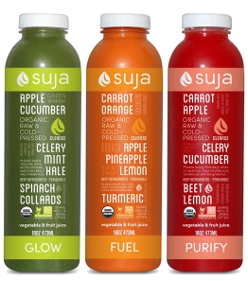I’m a bit obsessed with the dichotomy between fast and slow growth, particularly in the organic industry.
Why do some companies shoot to the top, while others languish?
What are the biggest factors to fast growth?
In an attempt to answer this question, I’m keeping my internal antennae on high alert, looking for success stories of organic companies that have demonstrated fast growth.
Next Accelerator has provided a free webinar featuring Jeff Church, CEO of one of the fastest growing organic juice companies ever – Suja.
In this article I share my 5 key takeaways from Jeff’s webinar. If you want big picture insights on how to grow your natural/organic products business online, then read on.
If you’re aiming to get your products in front of retailers, you should listen to the full presentation (length: 22 minutes, followed by 12 minutes of Q&A). Jeff talks about some fancy retail-related metrics and numbers that went completely over my head.
Why is Suja Juice growing so fast?
First, some background on the company. Founded in 2012, Suja was named #2 in Forbes Most Promising Companies in 2015. It’s 100% vertically integrated from a manufacturing standpoint, which means it “controls its own destiny.” CEO Jeff Church describes the company’s recent growth as an “aggressive, wild ride.”
The company started out very small, with co-founders Eric Ethans and Annie Lawless delivering coolers full of cold-pressed juice to local customers. At the time they started they didn’t even have a business name, let alone a scalable business model. Because it was unpasteurized and therefore unable to preserve nutrients, their initial cold-pressed juice product had a 3-4 day shelf life. Short shelf life = unsuitable for store distribution.
The co-founders later teamed up with Jeff Church, a Harvard Business School graduate and private equity veteran. He came across a disruptive (i.e., innovative) technology known as high-pressure processing (HPP), “which extends the shelf life of cold-pressed juice tenfold without altering its taste.” This technology made it possible for Suja to scale up their business and skyrocket their growth.
Suja went from minimal revenue in 2012 to $18 million in 2013 (its first full year of operation). A February 2014 Fortune article says, “Suja is the tale of two young entrepreneurs who had the good sense to hire some adult supervision…Without [Jeff Church] there would be little more than a kitchen operation of store-bought produce, a few juicers and repurposed coconut-water bottles.”
What is the key to Suja’s intense growth? Was it really the “adult supervision” they brought on?
Was it the fact that they were lucky enough to have Whole Foods as their first customer?
Jeff says if you want to succeed in retail, focus on these 3 areas:
1. Use data to help you win at retail
2. Build loyalty with your retailers
3. Have the right attitude
As a marketing consultant, I found that Jeff touched on 5 bigger picture concepts that hint at why Suja has grown so quickly. Regardless of whether or not you want to get into retail, take note of…
The 5 Qualities of Fast-Growing Companies
1. Fast-growing companies move their products ON and OFF the shelves.
The key concept here is movement.
Jeff asks: “How do you first get your products ON the shelf… then how do you get the products OFF the shelf?”
Wax on, wax off…
First you have to be smart enough, and perhaps a little lucky – capitalizing on good timing, relationship skills, and other factors – to get your products on the shelves of stores in the first place. That’s one battle. That’s a battle that defeats most.
Once you’re on those shelves, then you must get your products back OFF the shelves as quickly as possible. In other words, customers must buy your products! Your target is a moving one. If you get on the shelves but stay there for too long, you’re doomed.
2. Fast-growing companies ask, “Who do we want to compare [or contrast] ourselves to?”
Jeff mentions that getting in front of a retailer is ultimately about making a case (or a case study) for your business. You’re telling retailers: “Here’s where we are, here’s where we’re going, and here’s why you should take us and put us on the shelf.”
You do that by comparing yourself to other companies you want to compete with, and showing how your growth compares to their growth.
In marketing, this also translates into intensely contrasting yourself against who you’re not like.
3. Fast-growing companies figure out where their growth is coming from.
“Suja is growing super fast — where is that growth coming from? Is the whole pie increasing? Or is it that we’re taking share from other competitors? We measure that stuff,” says Jeff.
Fast-growing companies are growing for a reason. The growth is coming from somewhere specific. What gets measured gets increased… so measure your growth. Figure out where it’s coming from. This is not something you want to be clueless about.
4. Fast-growing companies seek first to understand, then to be understood.
Jeff quotes Stephen Covey who said: “Most people do not listen with the intent to understand; they listen with the intent to reply.”
If you want to get in front of retailers, then listen very carefully to what retailers are telling you [or consumers, clients, or whoever you’re aiming to serve]. Jeff shares the story of how Whole Foods asked Suja to provide a ‘control label product’ exclusively for Whole Foods stores. This request came in September 2012, three months after Suja launched their original product.
Meeting Whole Foods’ request required Suja to create a new brand. Even though Suja was a new company and it seemed totally counterintuitive to launch a new brand that early in the game – they did it because that’s what Whole Foods asked for. Suja developed the Elements brand, available exclusively at Whole Foods and selling for $4.99.
In order to sell their product at Costco, Suja realized it had to overcome a “channel conflict issue” – whereby consumers could get the same product at a lower price, simply by shopping at Costco instead of Whole Foods. The answer was to create a 3rd brand. Suja created the Essentials brand specifically for Costco – another action that seemed counterintuitive. But it’s what Costco wanted.
“When these retailers approach you, you want to be in a position to offer them what they want, because you never know when they’ll be around again,” Jeff says.
5. Fast-growing companies leverage their entrepreneurial nature, having the flexibility and speed to change gears quickly.
“As entrepreneurs, we have flexibility and nimbleness. That’s our asset. The asset we don’t have is our size and balance sheet to invest in certain things. But we do have speed and nimbleness, even if it’s counterintuitive to use it.”
Jeff makes the argument that you never get a second chance to make a good first impression. “When Whole Foods is your first customer, you’re kind of priced for perfection,” he says. “We were meticulous about making sure the orders were right.”
Move fast. Make use of your flexibility, even if it’s uncomfortable. Respond quickly and give your customers exactly what they want – even if it seems counterintuitive.
Those are my 5 key takeaways from Jeff Church’s webinar. Hope you enjoyed!
About the Author
Michelle Lopez is a copywriter and marketing consultant for organic/natural product companies with a strong message and mission. She helps independent companies create lifelong fans by strengthening their marketing, improving their sales copy, reaching more people, and selling more products online. Michelle is also the host and creator of The Organic CEO podcast, available on iTunes and Stitcher Radio.
Would you like to discover areas in your business where you can DOUBLE your organic product sales? Request an Organic Marketing Audit by applying here.
Like this article? Sign up below to get notified when there’s a new post.


 Michelle Lopez is a writer, editor, and copywriter with a BA in English/Creative Writing from the University of Colorado at Boulder.
Michelle Lopez is a writer, editor, and copywriter with a BA in English/Creative Writing from the University of Colorado at Boulder.